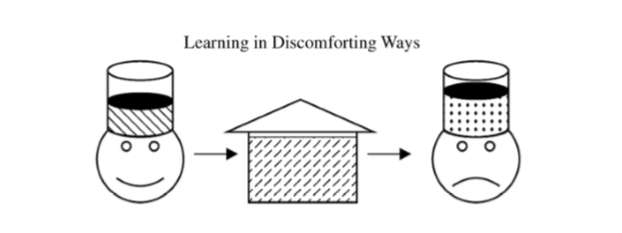March 18, 2015 - 16:17


Something I found very compelling about Kevin K. Kumashiro’s Against Common Sense: Teaching and Learning Toward Social Justice, was the idea of learning not being something that is easy or necessarily a ‘fun’ process. Kumashiro references the idea that education, in regards to both teaching and learning (which are deeply connected), as a constant and unending process, “[It] is never complete… never neutral.” (13). Here, learning is hard and tiring, but worth the effort in order to achieve a sense of perceptual unfinishedness which allows for continual learning. Knowledge, according to Kumashiro, is a fluid, ever changing idea that, as soon as one thinks they are close to grasping it, it changes. Because of this, “learning is not about acquiring more knowledge… [it] is about releasing our dependence on knowledge that has, until now, framed the ways we live in this world. In other words, central to the processes of teaching and learning is addressing the limitations of how we teach and learn and what we know and are coming to know.” (48)
In turn, every interaction must be scrutinized, every action analyzed, not necessarily in the pursuit of purging the ‘bad,’ but rather acknowledging the bad and how it relates to the ‘good’ and understanding that these label (good/bad) are arbitrary and changing and indicative of society’s present views on issues. Because there is so much variability, one can never be fully sure what they are teaching or what they are learning, but the constant struggle is to try and “…ask questions about the varied political implications of what was being learned… [understand] views and practices [have] different implications in different situations, and that determining an anti-oppressive course of action required assessing these differences… unearth the oppressive tendencies and anti-oppressive possibilities inherent in the very ways that we taught the disciplines…” (29)
One must constantly evaluate their role in a system, complicate it, and implicate the role in the continuation of social in justices, just to restart the process again the next day (similar to the idea discussed by Friere and Shor in our previous reading) These are difficult, strenuous and complicated tasks. Learning is something that brings discomfort and a lack of closure. This lack of closure allows for change, revolution, and the desire to do more work.
I was compelled by this because Kumashiro is basically telling me that learning sucks (in a good way). Similar to the way working out sucks, until you’re done for the day and get that sense of accomplishment and purpose, until the next day. It has to be on going because once we accept the status quo we have lost. If it were easy, we simply wouldn’t be doing it right, since the goal is to keep making it harder for ourselves.
Thus, I was drawn to Kumashiro’s figure of the student leaving the school with a changed understanding that mirrored neither the school’s nor the student’s own previous learning, and a frown. A smile means learnings over, the fight has been won, which can never truly be. So I liking the frown. It seems real to me, a symbol that something is happening. A smile can hide so much, but a frown (to me because I can’t call to mind a time when I held a frown in school that was not genuine) shows a candidness, and a motivation. It is hard to know what we want/like, but in seeing what we don’t want and/or like, we can deepen our understanding in a different way and see where we might need change, yet being critical of our desire, support, and opposition, understanding and revaluating the complexities of each.
While this was the case, I found myself slightly taken aback by the lack of discussion of the power and/or authority the teacher inadvertently possesses at any level. When a teacher is geared toward social justice in such a manner as Kumashiro, I think it can be easier to simply adhere to the intensity of the teacher, without fully grasping the importance and/or significance of what the teacher is trying to convey. Does this not limit the potency of the lesson? Students fall into social justice lessons, but only temporarily, as if it is an act for the teacher, rather than a mechanism of personal growth. Students, in the hopes of ‘doing well,’ both intentionally (for the sake of grading) and/ or unintentionally (believing they are growing), adhere to the teacher’s brand of activism/ social justice. In a realm where the teacher is given a degree of power they cannot escape, is there an inherent barrier to the type of education Kumashiro is speaking of in his work?
Though the process of learning is strenuous for the student, the teacher is too subjected to a rigorous task. With more power/ agency in the classroom setting, teacher must further implicate themselves and a mode to mollify some of the overbearing affect they might have on a student’s learning that is temporary. It’s not fun for the student or the teacher, no one is happy… but everyone is implicated and so we are all moving.
